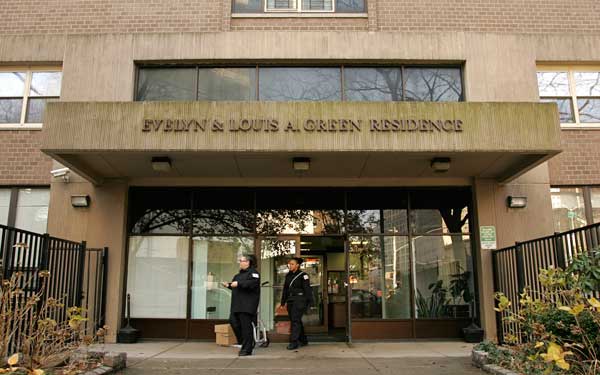
BY SAM SPOKONY | Some residents of a low-income senior housing facility near Cooper Square say that their building’s management and ownership failed to adequately prepare for and deal with the impact of Superstorm Sandy, leaving the residents confused, scared and angry throughout the ordeal.
Evelyn and Louis A. Green Senior Citizen Housing, a 14-story, 150-unit building at 200 E. Fifth St., lost power, water and elevator service for only about four days — a shorter period than in many other affected facilities in the city — but that was enough time for many of its elderly, disabled residents to require help that they say was never fully provided.
“It just doesn’t seem right,” said one tenant, who is in her 70s and has lived in the building for around 10 years. “No one knocked on my door with a meal, no one really even tried to help. It was obvious that no one had advocated for us in any way.”
The building, which is owned and operated by the Jewish Association Serving the Aging, or JASA, offers independent living — though is not a nursing home or an assisted-care facility.
“But independent living doesn’t mean inhumane,” said the tenant, who asked to remain anonymous because she feared retaliation from JASA or her building management. “This building is about service to the aged. It’s a senior building, that’s why people live here.”
The tenant explained that in the immediate aftermath of the storm, there was no attempt at communication made by JASA or the building’s in-house staff — until she and others were suddenly told to leave the building by JASA volunteers, whose presence apparently served more to confuse and incense the residents than to aid them.
“One young girl said to me, ‘You really should go to a shelter,’ and I found that insulting, patronizing,” the tenant said. “I use a walker, I have spinal damage, I’m on the 14th floor of a building with no elevator. How was I going to get to a shelter, when they clearly weren’t going to help me get there?”
The tenant added that those particular volunteers never asked if she needed supplies or any other help.
Another major complaint lodged by residents of the E. Fifth St. building was that the facility’s manager, Regina Pullman, left the premises immediately after the storm struck and was gone for about a week, leaving them without proper guidance through the blackout.
Pullman declined to comment, but a JASA spokesperson explained that Pullman had left to be with her mother, who had brain cancer and died in the days following the storm.
Even though Pullman may have had good cause to leave the building, many who experienced the blackout noted that her absence — and the lack of a replacement authority figure — left the residential community in chaos.
One woman, who visited the building to help a sick, elderly friend, explained that Pullman’s apparent replacement — a woman identified only as Leanne — seemed not to understand how to deal with the situation, or even how to classify the facility.
“It was pure pandemonium,” said the woman, who also asked to remain anonymous because she is currently on the waiting list to secure an apartment at the E. Fifth St. building. “I heard Leanne calling the cops, and she was telling them that this is an assisted-living building, when that’s not true. That’s what made me think she didn’t understand, or that maybe she didn’t work there.”
Donald Manning, JASA’s director of housing, asserted that Leanne was not a random replacement, and is in fact a JASA volunteer.
But the result, according to that woman and other residents, was that police and JASA volunteers didn’t immediately know who required desperate help or evacuation — such as residents with feeding tubes or other complicated medical needs — versus who, like the 14th-floor tenant, would be safer in their own apartments. And they believe that is what put certain residents in grave danger, which could have ended in disaster had the blackout not ended so soon.
“I can think of eight people I know in that building who could’ve died as a result of this,” said the woman who came to help her friend, whom she ended up taking to her own building uptown.
The real root of the problem, residents claim, was that JASA did not adequately prepare the E. Fifth St. building for the storm’s effects.
“There was absolutely no preparation beforehand,” said one resident, who is in her 80s and has lived in the building for nearly 10 years. “The only thing was a memo that they placed near the elevators, and it was in such small print that I could barely even read it.”
The resident added that, even though a large portion of the building’s residents are Chinese and speak only Cantonese, there was no translation provided beside the English memo.
In response to those complaints, JASA’s Manning stressed that the building is in fact in Zone B — not Zone A, the coastal area that the Mayor’s Office said would be at greatest risk from flooding by the storm — so it wasn’t assumed that the building would face such difficult circumstances.
“As soon as we realized it was going to get more involved, we took action,” Manning said. “We had food and volunteers, we called relatives, and we had a strategy. Our whole mission here is to support seniors.”
But many residents are also still angry that the building had no backup generator, a vital piece of equipment that could have prevented the blackout from ever occurring.
A 65-year-old tenant, who identified herself only as Teri, claimed she heard that Manning had promised to install a generator in the building back in summer 2003, after a Con Ed blackout during a heat wave created dangerous conditions.
“I remember that Manning was at a meeting held by the building management in 2003, and [another resident told me] he made the verbal promises at that point,” Teri said. “But after all this time, I guess it’s clear that he never intended to get one.”
When asked about that issue, Manning didn’t address the alleged promises, but said only that JASA didn’t have the funds to buy a generator for the E. Fifth St. building. He estimated that, for a building that size, it would cost around $350,000.
The building receives its primary funding in the form of subsidies from the U.S. Department of Housing and Urban Development.
Manning refused to disclose exactly how much money is allotted to the East Village building each year, but said that it is “a very small amount,” and is earmarked only for “security and building operations.”
He added that HUD recently indicated that it may be able to provide funds for generators to buildings like this one, but stressed that those ideas are in their early stages.
HUD could not be reached for comment by press time.
JASA, which provides a number of social services and programs to seniors throughout the city in addition to housing, currently has a budget of slightly more than $100 million, according to its 2012 annual report. More than $23 million of that is devoted to JASA’s housing, which serves around 2,400 seniors in three boroughs.




























